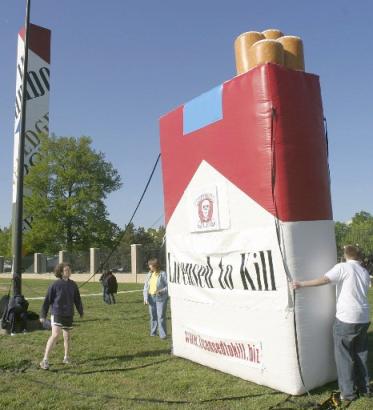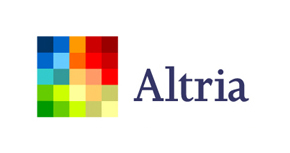|
GLOBAL
SOLIDARITY
AGAINST BIG TOBACCO

April 23-24, 2003
Richmond, VA
Photo
credit: AP/Wayne Scarberry
|
 |
=
|
 |
=
|
DEATH
|
ALTRIA/PHILIP
MORRIS
SHAREHOLDERS MEETING
TALKING POINTS
The
Global Toll
- 4.9
million people die every year from tobacco related illnesses
around the world
- by
2030 the global death toll is expected to rise to over 10 million
deaths every year. That is the equivalent of 95 jet planes crashing
each and every day of the year.
- by
2030 70% of all tobacco deaths will occur in developing countries
- 80,000-100,000
young people become addicted to tobacco every day
- 250
million children alive today will die due to tobacco
- One
of the greatest tragedies about this epidemic, is that it is
entirely preventable. What makes it different from other public
health is that there is a whole industry pushing it.
Altria/Philip
Morris International Stake
-
Earns almost 2/3 of its tobacco revenues overseas, and sells
3/4 of its cigarettes outside US
- Controls
14% of the entire world market for cigarettes
- Marlboro
is the global tobacco brand leader
- International
market increasingly important to the company as domestic market
shrinks
Altria/Philip
Morris Political Connections
-
Between the years of 1995 to 2000 donated $10 million to federal
candidates and political parties in the US
- Has
donated a great deal of money to the Bush campaign and many
within the Bush administration have close ties to Philip Morris.
Karl Rove, senior advisor to the president, served as political
consultant for Philip Morris for five years.
- Using
influence to try and weaken Framework Convention for Tobacco
Control and to battle the impending federal lawsuit
Altria/Philip
Morris targets youth
-
In the U.S., since the MSA, tobacco advertising in magazines
with high youth readership such as Rolling Stones and Sports
Illustrated have gone up by over 35%
- In
Cambodia, Philip Morris hires attractive young girls to distribute
free cigarettes on the street to young boys - these cigarettes
are often already lit to force the recipient to smoke it immediately
- In
Hungary, Philip Morris has launched the Marlboro Classics clothing
line, which allows them to continue to advertise their brand
without coming in conflict with tobacco advertising restrictions.
- In
Togo, baby-sized Marlboro cloths are found. Altria/Philip Morris
has said before that these cloths are "rip-offs",
but haven't done anything to stop them.
- In
West Africa, the company has sponsored huge concerts at which
cigarettes are distributed to children as young as 10.
- In
Poland, Philip Morris uses the internet to reach out to teens
and young adult smokers, especially women.
Altria/Philip
Morris's exploitation of the American/Western image
-
Uses the image of freedom, liberty and prosperity to sell tobacco
products with prominent American symbols such as the Golden
Gate Bridge and the Statue of Liberty
- Some
of its numerous American based names include: American, Americana,
California, Colorado, Dallas, Harvard, Kansas, New York, Raleigh
Extra and Texas
- In
2002, Philip Morris sponsored Andrzej Wajda / Philip Morris
Freedom Prize ($US 10,000) on Freedom Film Festival in Berlin.
The prize is aimed to support "independent" (i.e.
"young" in 99% of cases) movie directors and producers
from CEE countries. Andrzej Wajda is most famous Polish movie
director, producer, and Oscar Prize winner.
- In
Togo, Philip Morris advertises chances to win fashionable cloths.
An ad features four Africans and a White Westerner, with the
word "Fashion" in English, though the official language
is French. Three of the Africans shown are women, although smoking
among women has traditionally been discouraged in the country.
Bogus
"Youth Smoking Prevention" programs
-
In Thailand, Russia, and dozens of other countries, Philip Morris
has launched bogus "youth smoking prevention" programs
with a reverse psychology message: "Don't smoke before
you're 18." These campaigns are ineffective and studies
indicate that they may even encourage teens to smoke. Their
primary purpose is win credibility and influential allies, who
can maintain a favorable business environment for the company.
- In
Jordan, Philip launched a YSP campaign to coincide with the
promotion of a new line of Marlboro that is made in Jordan and
is 30% cheaper than imported Marlboros. Cheap smokes = more
smokers.
Altria/Philip
Morris Breaks the Law
- In
Vietnam, Philip Morris launched an illegal promotional campaign
with 80,000 gas lighters, 1,500 fuel lighters and thousands
of matchboxes, all bearing cigarette brands logos. Under Vietnamese
law, cigarette and tobacco advertising is prohibited in any
form. Philip Morris escaped fines for breaking the law.
- In
Australia, Philip Morris illegally targeted young women by using
a fashion parade to promote its Alpine cigarette brand. The
parade festivities included an Alpine cigarette kiosk where
attractive models sold cigarettes along with ice drinks to the
parade attendees. The promotion was in direct violation of Australian
law, which prohibits the display of tobacco advertisements in
public places. Philip Morris pleaded guilty to breaking the
ordinance. The maximum fine, however, is only $11,000, which
is nothing to a company that boasted $28,672,000,000 in sales
in the year 2002 alone.
- In
Thailand, Philip Morris challenged the country's plans to adopt
hard-hitting graphic health warnings, similar to ones now used
in Canada and Brazil.
- Philip
Morris sent a letter to Canada, to inform the country that a
ban Canada was considering on the [deceptive] terms "Light"
and "Mild" would violate the country's obligations
under the North American Free Trade Agreement (NAFTA) and the
World Trade Organization.
Miscellaneous
-
In Poland, Philip Morris sponsored a contest for journalists
who write about disability problems. This contest was part of
the broader campaign addressed to disabled people and their
organizations, but its main goal is to create positive image
of tobacco industry (and presumably obscure the tremendous disabilities
and death that the company's own products deliver to its customers)
- In
Togo, Philip Morris advertises Marlboro with the slogan "The
taste of adventure" (but not "The taste of cancer")
and Bond Street with the slogan "For those who know"
(…"how to pay a company to kill them"?)
- Philip
Morris has poured millions of dollars into sponsorship of Formula
One races, which reach massive audiences worldwide. Turkey has
just been chosen to host a Grand Prix in 2005. Tobacco sponsorship
of the races would be illegal, according to Turkey's tobacco
advertising ban. Turkish tobacco control advocates want Formula
One and the tobacco industry to make a public pledge that the
2005 races will be tobacco sponsorship-free. They have refused
to do so.
Global
Solidarity Against Big Tobacco
- U.S.
tobacco control advocates don't want successful efforts at home
to lead to more death and disease abroad in countries least
financially able to counter the epidemic. In many countries,
there is little or no budget for tobacco control.
- Today,
we are here to be a voice for all the young people, especially
females, who Philip Morris is aggressively targeting with its
death sticks around the world.
- Today,
we are here to be a voice for our colleagues around the world,
who are actively resisting the tobacco industry's quest for
ever-increasing profits at the expense of global health.
- Today,
we are here to be a voice for the 4.9 million people around
the world who are killed each year by tobacco. They no longer
have a voice at all.
- Many
low-income countries are already struggling to address a wide
range of health issues, e.g. AIDS and malaria. They don't need
tobacco-related diseases. Furthermore, money spent on cigarettes
diverts valuable resources away from food, housing, education,
and healthcare.
- Mention
that you are involved with Essential Action's Global Partnerships
for Tobacco Control program which links groups in the U.S. and
Canada with groups in the regions of the world in which Big
Tobacco is most aggressively expanding, i.e. Asia, Africa, Latin
America, and Central/Eastern Europe. Over 350 groups in more
than 40 U.S. states and 100 countries are involved with the
program.
- Mention
examples of how you have communicated/partnered with tobacco
control advocates in other countries.
Messages
that Our Global Partners Colleagues Want Us to Bring to Louis
Camilleri and Altria Shareholders
Click
here for a pdf version of the talking points
|
|


